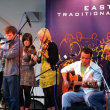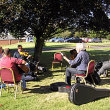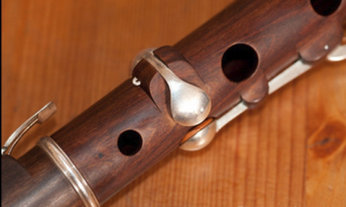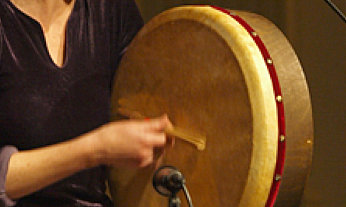









Contact - Martin Shane - info@eatms.co.uk - 02890 853676 - 07977 116595

eatms
Tin Whistle & Flute
Absolutely no previous music training is required! Through a series of easy steps, you'll learn to sound a progression of notes, and then build these notes into simple tunes. A simple tube of metal with six finger-holes, the tin whistle has an expressive range that can encompass everything from the speed and excitement of dance music to the haunting and emotionally charged expression of slow airs. This course teaches the basics of whistle-playing, covering such aspects as tonguing, vibrato and slurring, and including some ornamentation and variation. Students will concentrate on slow airs, jigs and polkas, but other forms may be touched on as well . You will also learn about the different types of tunes in Irish music and a bit about the traditions and culture surrounding traditional music the tin whistle is easy to get started on but gives you plenty of room to explore.Harp
The harp is one of the most beautiful sounding instruments. This class is designed for the absolute beginner. You will be taught basic techniques and simple pieces to get you started. No experience necessary. Playing the Harp is instantly gratifying - no difficulty in getting a sound out as in a flute or reed instrument, no screechy bowing as in a violin. The harp strings are tuned in a diatonic scale (major) so there are more 'right' notes and fewer 'wrong' notes. The 'open' diatonic scale is easy to understand. Anyone regardless of age can learn to play the harp so long as he or she has the interest and is willing to spend some time practising to achieve progress. Students learn the correct sitting and hand position, fingering and plucking techniques will be emphasized at the beginning to develop a sound technique and good tone production.

Fiddle
Learn the fundamentals of fiddling. Work on the basics such as posture, bow control, and intonation. As you grow more comfortable with the fiddle, we will learn basic fiddle tunes together. Develop your ear and expand your repertoire of tunes. Improve bow control and intonation as you start to feel the rhythm that separates fiddlers from violinists. Continue to develop your technique and your list of tunes. Work on advanced left and right hand techniques, such as slides and slurs, and double-stops. Develop the right hand bowing techniques and left hand ornamentations that give Irish fiddling some of its subtle characteristics as you develop your repertoire of Irish fiddle tunes. Learning tunes by ear. No music reading skills are required at all. Tunes are taught phrase by phrase, repeated as necessay. Most students find that a small pocket cassette or minidisc recorder is helpful in the classes to record the tutor playing the tune slowly and up to speed, to serve as a memory aid afterwards. Beginners The Beginners class is for those who are still getting to grips with the instrument and are not ready to go up to the improving beginners level. Improving Beginners The Improving Beginners Class is the next level up. Some experience of holding a fiddle is required. This class is ideal for those who have progressed beyond the absolute beginners class.Bodhrán & Bones
On one hand, we learn the playing techniques of this fascinating and versatile drum and on the other hand, we concentrate on the rhythms of music. There are no prerequisites; we will work without notes, using listening, feeling and humour instead. professional bodhráns are available to participants and if so desired, can be purchased through the School. Classes cover Introduction to the Bodhran, Holding the Stick, The Basic Stroke, Swing & Straight Rhythm, Types of Tippers, Finding Drums and Sticks, Use of the left hand. In Europe today, bones are most widely heard in connection with Irish, English, and Scottish folk music, and also in many other nearby musical cultures. Early English and Irish settlers introduced the bones into North America. They were used primarily as an accompaniment to jigs and reels to keep the beat steady by duplicating the rhythm of the music. Bones should not be confused with spoons.

classes
As part of a student’s personal development we have arranged for 'Sessions' to take place in the Gasworks in Carrickfergus where you will have an opportunity to play with others who have similar skill levels as you. This is a valuable opportunity which it is expected all will take part and assist in developing your skills in tandem with your own practice.Guitar & Mandolin
Our guitar class not only concentrates on accompanying the Irish tunes, but also looks at song accompaniment and arrangement. It may feel daunting the first time you pick up the guitar and decide your going to learn how to play a few songs. It's very easy to get fed up and stop practising, this is the last thing you should do. It's well worth the effort you put in. The hardest part is the first few weeks.


Contact - Martin Shane - info@eatms.co.uk
02890 853676 - 07977 116595

eatms
Tin Whistle & Flute
Absolutely no previous music training is required! Through a series of easy steps, you'll learn to sound a progression of notes, and then build these notes into simple tunes. A simple tube of metal with six finger-holes, the tin whistle has an expressive range that can encompass everything from the speed and excitement of dance music to the haunting and emotionally charged expression of slow airs. This course teaches the basics of whistle-playing, covering such aspects as tonguing, vibrato and slurring, and including some ornamentation and variation. Students will concentrate on slow airs, jigs and polkas, but other forms may be touched on as well . You will also learn about the different types of tunes in Irish music and a bit about the traditions and culture surrounding traditional music the tin whistle is easy to get started on but gives you plenty of room to explore.Harp
The harp is one of the most beautiful sounding instruments. This class is designed for the absolute beginner. You will be taught basic techniques and simple pieces to get you started. No experience necessary. Playing the Harp is instantly gratifying - no difficulty in getting a sound out as in a flute or reed instrument, no screechy bowing as in a violin. The harp strings are tuned in a diatonic scale (major) so there are more 'right' notes and fewer 'wrong' notes. The 'open' diatonic scale is easy to understand. Anyone regardless of age can learn to play the harp so long as he or she has the interest and is willing to spend some time practising to achieve progress. Students learn the correct sitting and hand position, fingering and plucking techniques will be emphasized at the beginning to develop a sound technique and good tone production.

Fiddle
Learn the fundamentals of fiddling. Work on the basics such as posture, bow control, and intonation. As you grow more comfortable with the fiddle, we will learn basic fiddle tunes together. Develop your ear and expand your repertoire of tunes. Improve bow control and intonation as you start to feel the rhythm that separates fiddlers from violinists. Continue to develop your technique and your list of tunes. Work on advanced left and right hand techniques, such as slides and slurs, and double-stops. Develop the right hand bowing techniques and left hand ornamentations that give Irish fiddling some of its subtle characteristics as you develop your repertoire of Irish fiddle tunes. Learning tunes by ear. No music reading skills are required at all. Tunes are taught phrase by phrase, repeated as necessay. Most students find that a small pocket cassette or minidisc recorder is helpful in the classes to record the tutor playing the tune slowly and up to speed, to serve as a memory aid afterwards. Beginners The Beginners class is for those who are still getting to grips with the instrument and are not ready to go up to the improving beginners level. Improving Beginners The Improving Beginners Class is the next level up. Some experience of holding a fiddle is required. This class is ideal for those who have progressed beyond the absolute beginners class.Bodhrán & Bones
On one hand, we learn the playing techniques of this fascinating and versatile drum and on the other hand, we concentrate on the rhythms of music. There are no prerequisites; we will work without notes, using listening, feeling and humour instead. professional bodhráns are available to participants and if so desired, can be purchased through the School. Classes cover Introduction to the Bodhran, Holding the Stick, The Basic Stroke, Swing & Straight Rhythm, Types of Tippers, Finding Drums and Sticks, Use of the left hand. In Europe today, bones are most widely heard in connection with Irish, English, and Scottish folk music, and also in many other nearby musical cultures. Early English and Irish settlers introduced the bones into North America. They were used primarily as an accompaniment to jigs and reels to keep the beat steady by duplicating the rhythm of the music. Bones should not be confused with spoons.

classes
As part of a student’s personal development we have arranged for 'Sessions' to take place in the Gasworks in Carrickfergus where you will have an opportunity to play with others who have similar skill levels as you. This is a valuable opportunity which it is expected all will take part and assist in developing your skills in tandem with your own practice.Guitar & Mandolin
Our guitar class not only concentrates on accompanying the Irish tunes, but also looks at song accompaniment and arrangement. It may feel daunting the first time you pick up the guitar and decide your going to learn how to play a few songs. It's very easy to get fed up and stop practising, this is the last thing you should do. It's well worth the effort you put in. The hardest part is the first few weeks.



















